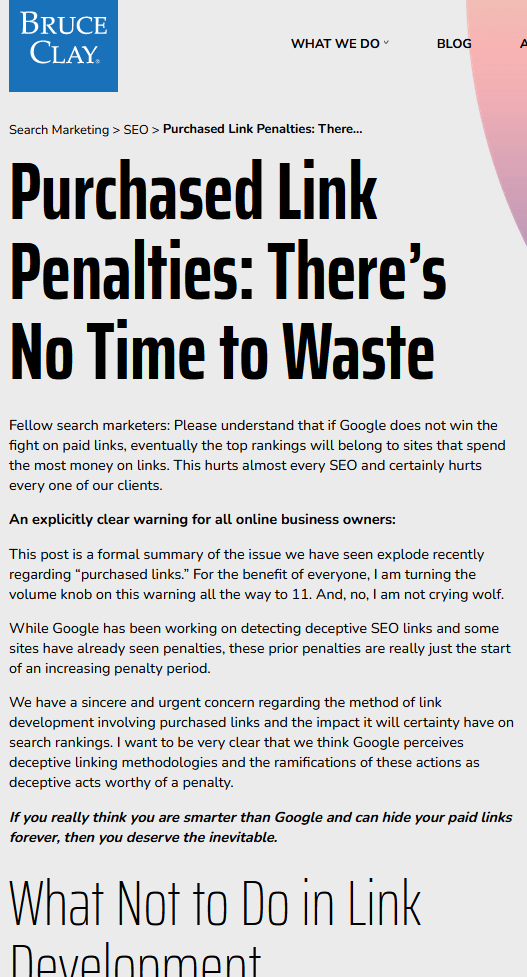Google's nofollow Rule (2010)
Google invented the
rel="nofollow"
in 2005.
This is not a HTML standard.
However, it actually passes W3C's validator.
Also, the nofollow is gimmicky by-product designed just for the benefit of Google.
It really have nothing to do with the goal of HTML as a communication format.
Quote from Nofollow:
The concept for the specification of the attribute value nofollow was designed by Google's head of webspam team Matt Cutts and Jason Shellen from Blogger.com in 2005.
The nofollow HTML attribute was originally designed to stop comment spam on blogs. Believing that comment spam affected the entire blogging community, in early 2005 Google's Matt Cutts and blogger's Jason Shellen designed the attribute to address the problem.
The specification for nofollow is copyrighted 2005 to 2007 by the authors and subject to a royalty free patent policy, e.g., per the W3C Patent Policy 20040205, and IETF RFC 3667 and RFC 3668. The authors intend to submit this specification to a standards body with a liberal copyright/licensing policy such as the GMPG, IETF, and/or W3C.
…
Search engines have attempted to re-purpose the nofollow attribute for something different. Google began suggesting the use of nofollow also as a machine-readable disclosure for paid links, so that these links do not get credit in search engines' results.
In particular, “nofollow” is invented by Google. Why is Google allowed to create such usage? It seems the primary purpose of such usage is just to benefit Google itself in its search result ranking. (can this be likened to how early Netscape creating lots of non-standard tags to benefit itself, or how Microsoft created non-standard behavior in their browsers?)
Also, the “nofollow” was originally created to indicate spam links (as in blog comments), but now it seems to be used as a indicator of commercially sponsored link.
Is the “nofollow” invention actually contributing to the whole society in good ways? I'm not sure. One may argue that it prevented lots of spams and improved search results. But from another perspective, i think it merely created a additional minor strategy variation in the war of aggressive marketers vs Google search engine.
Punishment from Google?
Am pissed about this personally because i started to try to monetize my site this year (2010). Earlier this year, i sold some links to some questionable seo site, before i knew about “nofollow”. The link destinations have no relevance to my pages and the destination seem to be shady seo sites. After about 3 months, i discovered “nofollow”, i put it in, and clearly my client didn't like it, and simply canceled. (despite my offer to put their links to 100 times more pages. Clearly, they are specifically after my site's ranking) I do not know if Google has “penalized” my site due to this incident.
Another issue is that i use text-link-ads.com 's service to monetize my site. However, text link ads does not allow nofollow. I'm happy to get money for my writing efforts on my site, but am not happy of the fact that Google considers it a bad practice.
It seems sensible that as a author of a web page, that if i deem a link relevant, appropriate, benefits my readers, even if it's paid and i clearly marked the link as “sponsored link”, i should be allowed to do so without adding the “nofollow”, and Google shouldn't punish my site because i have paid links.
Whether a link is commercially sponsored, does not necessarily correspond to it being not useful for readers.
Thanks Adrienne Boswell for a correction that “nofollow” isn't a attribute.
Here is a comment i made to a blog about paid links At

google invented the nofollow stuff. Not saying it's evil, but in one aspect Google is forcing a unnatural rule on what link should or should not be. In a sense, Google force this to webmasters to maker THEIR job of doing a search engine easier.
this backfires, and now we have a huge market of paid links.
it's hard to see a technical solution that can solve this, as others mentioned here.
i think Google should abandon the nofollow rule. Change their algorithm for page rank to not use link so much, or something. It's their job to do search ranking, they should not force a unnatural rule on webmasters.
if natural links (paid links) screw up Google search, too bad. Perhaps other search engine would do better.
i think it's kinda crude in today's tech advancement that webmasters need to manually deal with follow/nofollow links. By W3C HTML spec, link is just a link, there is no such thing as nofollow. I don't see any benefit of introducing this nofollow thing to humanity in general other than just benefiting Google.
when Google stop the nofollow rule, the paid link problem will probably naturally dissolve too. And i doubt that search result quality, may it be Google or others, will degrade.